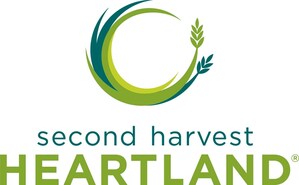Boston Consulting Group to Second Harvest Heartland: Minnesota is Leaving More Than $200 Million in Food and Money on the Table
Findings propel six Feeding America food banks serving Minnesota to partner to increase federal food benefits for nearly 180,000 hungry Minnesotans
SAINT PAUL, Minn., April 13 /PRNewswire/ -- Second Harvest Heartland, the Upper Midwest's largest hunger relief organization, today announces the results of a pro-bono study conducted on its behalf by The Boston Consulting Group (BCG), a worldwide strategy consulting firm. That study indicates that Minnesota is leaving approximately $210 million in food and money on the table by not fully participating in the Supplemental Nutrition Assistance Program (SNAP, formerly known as "Food Stamps").
"SNAP is one of the best and biggest tools available to positively impact hunger in Minnesota and, as a result, positively impact our state's economy as well," said Rob Zeaske, executive director of Second Harvest Heartland. "BCG's study indicates that Minnesota is significantly underutilizing SNAP and, in my opinion, is egregiously leaving food and money on the table."
According to the report, Minnesota trails all but seven states in SNAP participation with only 302,000 of the state's 670,000 income-eligible residents receiving benefits. In addition, only five states have higher costs to administer SNAP. BCG suggests that by enrolling currently eligible but non-participating individuals into the program, Minnesota would add $210 million to its annual economy as a result of direct benefits and a multiplier effect as new recipients shop in local food stores.
In addition, BCG states that by bringing Minnesota's SNAP per-case cost closer to the national average, the state would potentially save $29 million annually. In total, by becoming a cost-effective and high-performing administrator of SNAP, Minnesota could see nearly $240 million in annual economic stimulus, local jobs and savings.
The BCG report notes that of the 368,000 eligible Minnesotan's not participating in SNAP, 169,000 don't realize they are eligible and 130,000 are deterred by cumbersome administrative requirements. To address these participation barriers, BCG recommends five specific initiatives, including a heightened awareness campaign, aggressive enrollment outreach efforts, a phone interview option, cross-referencing eligibility with other support programs, and simplified eligibility criteria, the latter of which is currently in progress in the Minnesota Legislature. The report also recommends a sixth initiative, migrating from a county-directed to a state-directed program, to push Minnesota into the 10 lowest-cost states for SNAP administration. If implemented, these initiatives would add an estimated 178,000 more Minnesotans into SNAP and move the state into the top 10 nationally for SNAP participation.
"Minnesota is facing a multi-billion dollar budget gap and area food shelves are experiencing a 40 percent increase in visits," said Peter Lawyer, senior partner and managing director of The Boston Consulting Group's Minneapolis office. "The SNAP program can be an effective safety net for families and individuals who are facing tough times—and Minnesota's taxpayers have already picked up the tab. Our recommendations will help make sure that these benefits reach eligible recipients and that the state's economy gets a much-needed boost."
Second Harvest Heartland is working with a number of government, corporate and community partners to determine if and how to pursue BCG's recommendations. In particular, Second Harvest Heartland and Minnesota's five additional Feeding America food banks, including North Country Food Bank in Crookston, Minn.; Second Harvest Northern Lakes Food Bank in Duluth, Minn.; Second Harvest North Central Food Bank in Grand Rapids, Minn.; Channel One Food Bank in Rochester, Minn.; and Great Plains Food Bank in Fargo, N.D., are working together to release the BCG findings statewide and to create a broader dialogue around encouraging Minnesota to become a cost-effective and high-performing administrator of SNAP.
Second Harvest Heartland requested the BCG study after unveiling its Missing Meals report last year. That report showed that low-income Minnesotans miss 125 million meals every year—12 percent of their food needs—and compelled Second Harvest Heartland and Minnesota's five additional Feeding America food banks to take immediate action to address the gap. Both reports can be viewed in their entireties at www.missingmeals.org.
About The Boston Consulting Group
The Boston Consulting Group (BCG) is a global management consulting firm and the world's leading advisor on business strategy. BCG partners with clients in all sectors and regions to identify their BCG's customized approach combines deep insight into the dynamics of companies and markets with close collaboration at all levels of the client organization. This ensures that BCG's clients achieve a sustainable competitive advantage, build more capable organizations, and secure lasting results. Founded in 1963, BCG is a private company with 69 offices in 40 countries. To learn more, visit www.bcg.com.
About Minnesota's Feeding America Food Banks
More than 200 food banks nationwide belong to Feeding America, the nation's leading domestic hunger relief network. Minnesota's six Feeding America food banks, including Second Harvest Heartland in St. Paul, Minn.; North Country Food Bank in Crookston, Minn.; Second Harvest Northern Lakes Food Bank in Duluth, Minn.; Second Harvest North Central Food Bank in Grand Rapids, Minn.; Channel One Food Bank in Rochester, Minn.; and Great Plains Food Bank in Fargo, N.D., collectively distributed nearly 70 million pounds of grocery products last year to hungry seniors, families and children through more than 2,500 non-profit member agencies and programs, including food shelves, soup kitchens, shelters, senior centers, faith-based organizations, and children's after-school programs. Together, Minnesota's six Feeding America food banks serve 86 counties in Minnesota, 53 counties in North Dakota, and 24 counties in western Wisconsin. To learn more about each of Minnesota's six Feeding America food banks, visit their respective web sites at www.2harvest.org, www.northcountryfoodbank.org, www.northernlakesfoodbank.org, www.secondharvestncfb.com, www.helpingfeedpeople.org, and www.lssnd.org.
SOURCE Second Harvest Heartland
WANT YOUR COMPANY'S NEWS FEATURED ON PRNEWSWIRE.COM?
Newsrooms &
Influencers
Digital Media
Outlets
Journalists
Opted In





Share this article